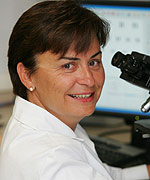El análisis genético de las células tumorales ha proporcionado información fundamental sobre la biología del cáncer
Genetic analysis of tumor cells has provided fundamental insights into the biology of cancer.
María José Calasanz, researcher at Genetics of the University of Navarra, participated in the European Leukemia Week organized by DOMENA.

According to María José Calasanz, researcher at department of Genetics of the University of Navarra, "the genetic analysis of tumor cells has provided very valuable information to understand how cancer acts, as well as to make more accurate diagnoses and prognoses".
The professor of the School of Sciences participated in a roundtable on the diagnosis and integral treatment of hematological patients within the conference organized by DOMENA on the occasion of the European Leukemia Week.
The director of the Genetic Analysis Service of the academic center explained that the presence of certain genetic or chromosomal markers in leukemias and lymphomas "makes it possible to decide on the most appropriate therapy, follow the evolution of the disease and evaluate the response to treatment".
The efficacy of genetic diagnosis has also improved thanks to new diagnostic techniques in molecular cytogenetics and molecular Genetics . "The publication of the complete sequence of the human genome has helped to expand the knowledge on the genetic mechanisms underlying numerous hematological malignancies - a set of malignancies that affect the blood, bone marrow and lymph nodes," adds the expert.
On the other hand, more sophisticated genetic analysis strategies - such as CGH arrays, expression arrays or automatic sequencing - have resulted in greater speed in describing new therapeutic targets and developing specific drugs that act directly on the cells that cause the disease. "However, we are finding more and more genetic markers and this is forcing us to review the current systems for classifying the disease and the corresponding risk groups," the researcher stresses.
Genetic diagnostics for 20 Spanish hospitals
The Genetic Analysis Service of the University of Navarra, directed by María José Calasanz, carries out these programs of study to diagnose leukemias and lymphomas for 20 hospitals in northern Spain. It analyzes around 4,000 samples a year.
For its part, the association DOMENA (association Eduardo Domezáin de Donantes de Médula de Navarra) was created in 2009 to promote bone marrow donation and provide support to those affected by this disease. At the roundtable, held at the Pamplona Planetarium, Felipe Prosper, director of the Clinic's department Hematology and Cell Therapy Department, also spoke about the problem from the perspective of stem cells.
